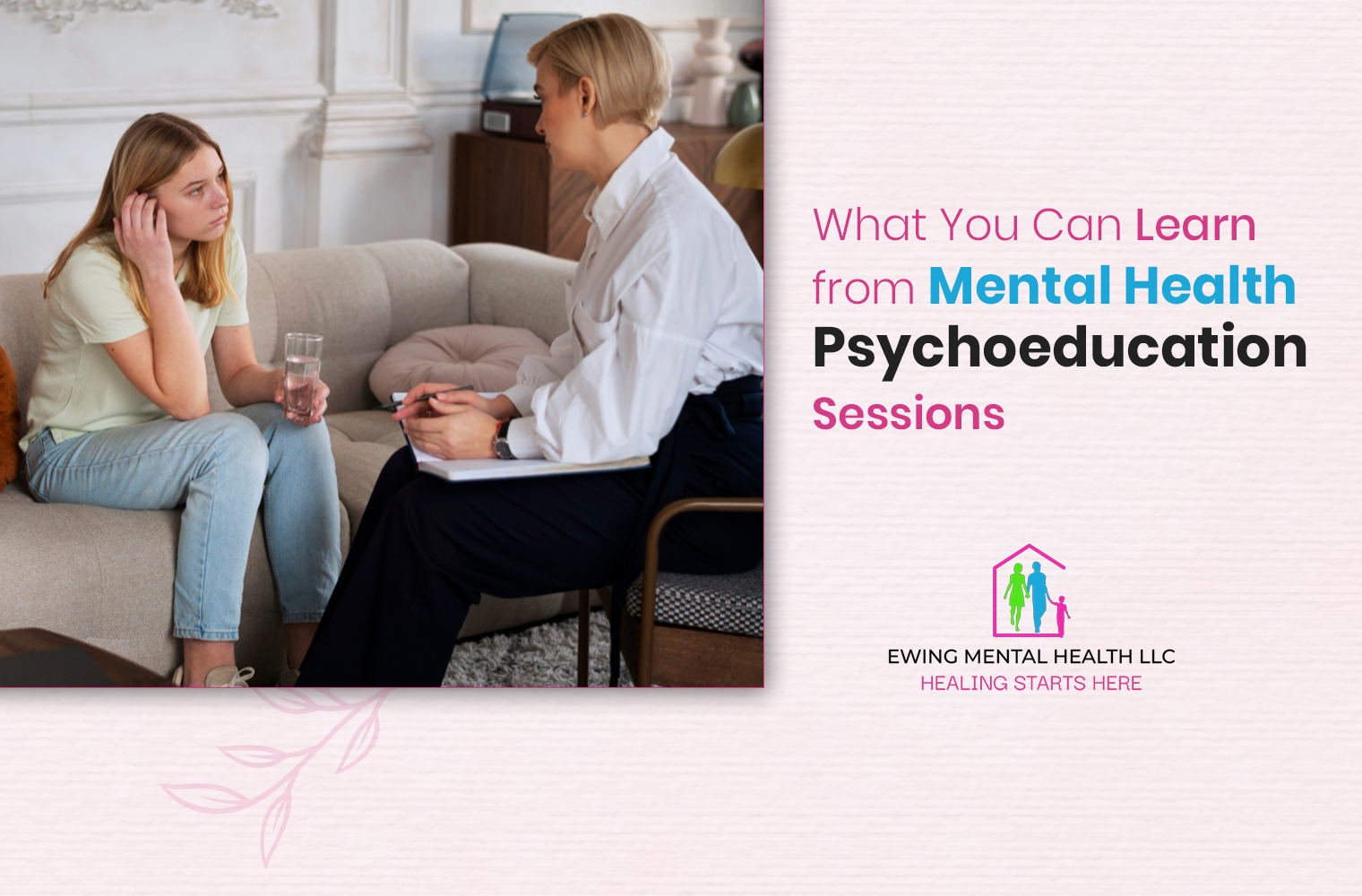Psychoeducation sessions are practical. They teach you how your mind actually works and why you react the way you do to stress, relationships, and daily issues.
And you don’t have to be in crisis to benefit from this kind of learning. More healthcare providers are catching on to this.
At Ewing Mental Health LLC, we’ve integrated mental health education after seeing how much clarity helps our patients.
Here’s what you’ll actually walk away with.
The Mind and Body Connection
The first thing that usually surprises people in psychoeducation sessions is learning how connected their mind and body really are.
Your body has been sending you messages this whole time. You’ve probably been ignoring them or writing them off as random.
Your racing heart isn’t just randomly happening; it’s your anxiety.
Here’s what starts clicking for people:
- Weekend headaches often mean you’ve been holding stress all week
- Your stomach issues could be anxiety showing up in physical form
- That exhaustion you can’t shake might be depression, not just being tired
- Your sleep problems are often your mind’s way of processing emotions
Once you connect these dots, you stop feeling like your body is working against you.
Learning Coping Mechanisms That Work
Forget the generic “just relax” advice. Real psychoeducation gives you strategies that fit your actual life.
- Spotting your warning signs before you hit the wall
- Learning what recharges you versus what just wastes time
- Being able to identify your exact stress triggers in order to prepare against them
- Creating practical everyday routines that favor your mental well-being
Perhaps meditation is not your cup of tea, but a 10-minute walk refreshes your mind totally. Through these sessions, you learn what really works with you.
Getting Evidence-Based Information
There’s a lot of misinformation out there about mental health. Social media doesn’t help.
Half of what you read is wrong or oversimplified.
Psychoeducation sessions cut through all that noise with actual facts.
- Mental health conditions are medical conditions with real biological components
- Medication isn’t a sign of weakness any more than taking insulin for diabetes is
- Therapy isn’t just complaining to someone who nods and takes your money
- You’re not broken if standard treatments don’t just work immediately
This information is so liberating. As you know what is occurring in your mind, shame will begin to lose its hold over you.
Learning to Speak Up (and Not Feel Nervous)
Something that is a surprise to people regarding psychoeducation is that it teaches you so much about communication.
It is not only about voicing feelings, although it is a part of it, but about stating your needs clearly.
- To say you are struggling without feeling like you’re trying to complain
- Requesting specialized assistance rather than expecting people to figure it out for you simply
- Setting boundaries that will not cause self-guilt
- Helping friends and family without making their issues yours
Such skills extend into all your other relationships. Conversations, which initially did not seem possible, now look doable.
Spotting Problems Before They Take Over
The most valuable thing you learn is how to catch problems before they snowball. Your patterns become visible to you.
- Knowing when you’re isolating before loneliness becomes overwhelming
- Noticing sleep changes before insomnia takes over completely
- Catching negative thought spirals in their early stages
- Identifying when stress is building up before it explodes
Want To Learn More About Your Mental Health?
That is the thing with knowledge: you cannot unlearn it once you know that. And that is why psychoeducation is so potent.
When you are tired of making assumptions about your mental well-being and want to learn more about it, the experienced professionals of Ewing Mental Health LLC in Hamilton, New Jersey, provide in-depth psychoeducation as a core element of our evidence-based care strategy.
Our team develops individual care plans with the approach not only to educate, but to actively support on an ongoing basis with psychiatric follow-ups, supportive therapy and medication management when necessary.
Contact Ewing Mental Health LLC by calling today at (609) 439-4351 and begin getting to know yourself better. Our telehealth appointments make it easier for you to access care.
FAQs
Do you need a diagnosis to benefit from psychoeducation?
Not at all. Understanding mental health helps everyone navigate life’s ups and downs better.
Is this the same as therapy?
No, psychoeducation is more educative, whereby therapy goes deeper into personal experiences. The two blend very well.
How long does it take to see benefits?
Many people notice shifts in understanding right away, though building new habits takes time.


